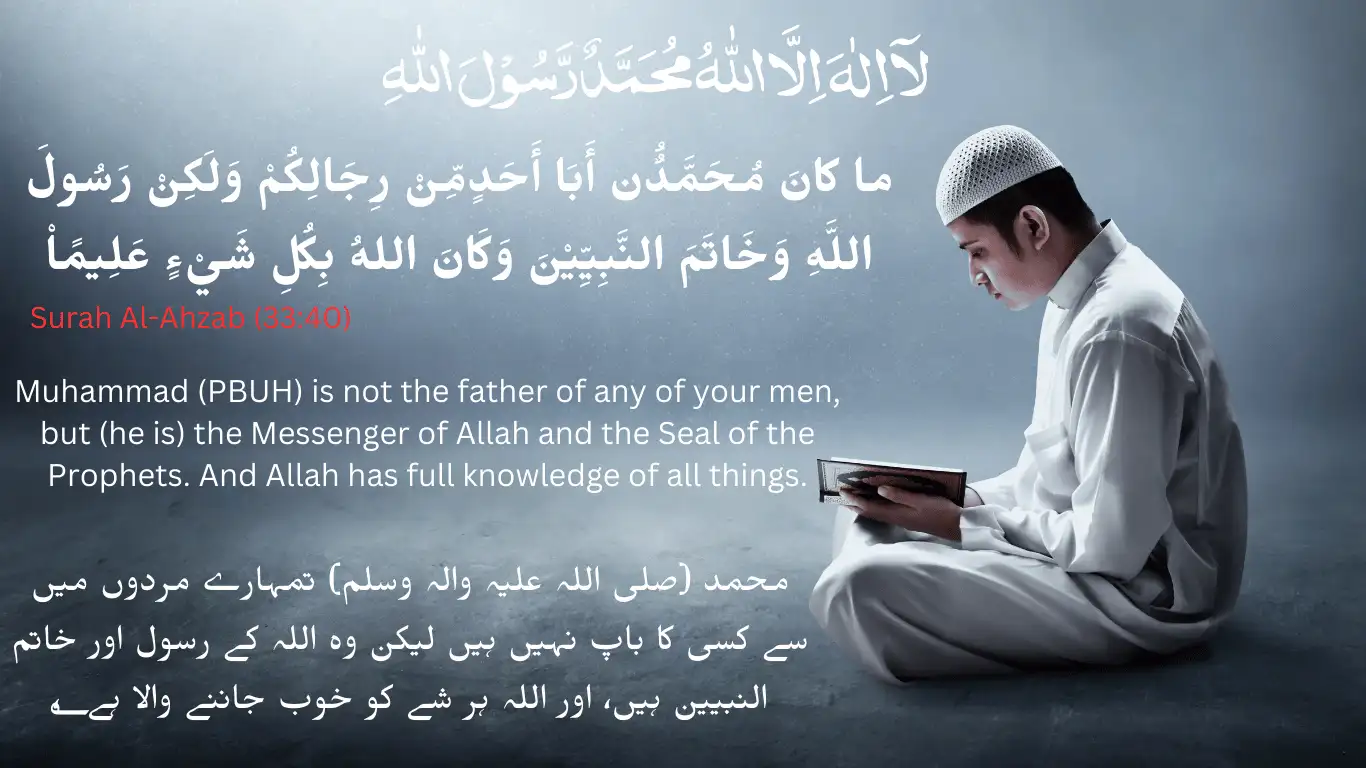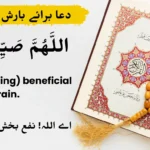The verse Ma Kana Muhammadun Aba Ahadin originates from Surah Al-Ahzab (33:40), a powerful chapter in the Holy Quran. This verse holds deep significance in Islam as it clarifies the honorable position of Prophet Muhammad (PBUH) and sets the foundations for his unique role as the final messenger of Allah. This article will explore the complete verse with Arabic, Urdu, and English translations, along with its meanings and context.
| Allahumma Innaka Afuwwun Dua Meaning in Urdu |
| Fasayak Fi Kahumullah- Al-Baqarah Ayat 137 |
| Rabbi Zidni Ilma: A Dua for Knowledge |
| Watawakkal Aala Allahi wakafa billahi wakeela |
Complete Verse in Arabic, Urdu, and English
Arabic:
ما كانَ مُحَمَّدٌُن أَبَا أَحَدٍمِّنْ رِجَالِكُمْ وَلَكِنْ رَسُولَ اللَّهِ وَخَاتَمَ النَّبِيِّيْنَ وَكَانَ اللهُ بِكُلِ شَيْءٍ عَلِيمًاْ
Urdu Translation:
“محمد (صلی اللہ علیہ والہ وسلم) تمہارے مردوں میں سے کسی کا باپ نہیں ہیں لیکن وہ اللہ کے رسول اور خاتم النبیین ہیں، اور اللہ ہر شے کو خوب جاننے والا ہے،”
English Translation:
“Muhammad (PBUH) is not the father of any of your men, but (he is) the Messenger of Allah and the Seal of the Prophets. And Allah has full knowledge of all things.”
Understanding the Context of Surah Al-Ahzab (33:40)
Surah Al-Ahzab addresses significant historical and spiritual themes. The verse ما كانَ مُحَمَّدٌُن emphasizes two primary messages:
- Prophet Muhammad (PBUH) as the Seal of Prophets:
This verse clearly states that Prophet Muhammad (PBUH) is the final prophet. The term Khatam an-Nabiyyin (خاتَمَ النَّبِيِّيْن) means ‘Seal of Prophets,’ indicating no prophet will come after him. - Clarification Regarding Adoption:
In the Arab tradition, adopted sons were considered biological sons. This verse clarifies that Prophet Muhammad (PBUH) is not the biological father of anyone, breaking misconceptions about lineage.
Through these points, this verse highlights the finality of prophethood and reinforces monotheism’s essence.
The Role of Prophet Muhammad (PBUH)
Prophet Muhammad (PBUH) holds a unique and exalted status as Rasool Allah (رسول الله), the messenger who delivered the final revelation, the Holy Quran. His prophethood was a universal message for all of humanity, transcending time and geography.
The phrase ‘Seal of Prophets’ signifies that his message completes and perfects all previous scriptures revealed to earlier prophets like Prophet Moses, Prophet Jesus, and others (peace be upon them all).
Significance of this Verse
- Finality of Prophethood:
This verse eliminates any confusion about subsequent prophets. - Clarification of Relationships:
By denying any biological son, the verse upholds the principle of fairness and truthfulness in Islamic teachings. - Universal Message:
The emphasis on Prophet Muhammad’s (PBUH) role as the last messenger unifies the faith of Muslims worldwide.
Relevance in Today’s World
In modern times, this verse remains significant as a guiding principle in Islamic theology and identity. It reminds believers to:
- Uphold the teachings of the Holy Prophet Muhammad (PBUH).
- Reject claims of false prophets.
- Strengthen unity by adhering to the final message of Islam.
Conclusion
The verse Ma Kana Muhammadun Aba Ahadin from Surah Al-Ahzab (33:40) holds immense importance in the faith of Islam. It establishes Prophet Muhammad (PBUH) as the final prophet and emphasizes his unparalleled role in delivering Allah’s message. By understanding this verse, Muslims can deepen their faith and reflect on its profound message.
May Allah guide us all to follow the teachings of the Prophet Muhammad (PBUH) and live according to the principles of Islam.
FAQs
This verse means that Prophet Muhammad (PBUH) is not the biological father of any man but is the final messenger of Allah and the Seal of the Prophets.
This verse is found in Surah Al-Ahzab (33:40) of the Holy Quran.




